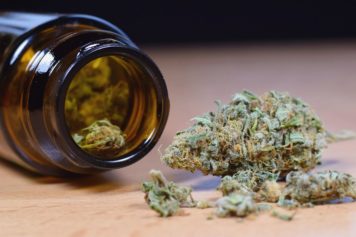
The San Francisco DA’s office will dismiss 3,000 misdemeanor possession cases and review nearly 5,000 felony cases for possible action. (Photo by Sigrid Olsson/Getty Images)
In an unprecedented move, San Francisco is set to expunge or reduce thousands of prior marijuana convictions dating back decades, District Attorney George Gascón announced Wednesday, Jan. 31.
The move, which will retroactively apply California’s pot-legalization laws to past criminal cases, will benefit thousands whose drug convictions resulted in criminal records that have the potential to hurt their chances of landing a job or even secure housing, the San Francisco Gate reported.
The 2016 passage of Proposition 64 not only legalized recreational pot for those 21 and older but also allowed those with past pot convictions that would’ve been a lesser crime under Prop 64 to petition the courts to have their cases dismissed. Due to the costly and time-consuming process, however, only 23 petitions for dismissal/reduction have been filed in the city since the law first passed.
“Instead of waiting for people to petition — for the community to come out — we have decided that we will do so ourselves,” Gascón said at a news conference, where he was joined by city Supervisors Malia Cohen and Jeff Sheehy, and head of the San Francisco branch of the NAACP, Rev. Amos Brown.
“We believe it is the right thing to do,” he added. We believe it is the just thing to do.”
Gascón said his office plans to dismiss and seal over 3,000 misdemeanor pot convictions in the city dating back to 1975, the SF Gate reported. Prosecutors will also review nearly 5,000 felony marijuana cases for possible action, he said. Individuals who have marijuana convictions tied to other offenses may not be eligible, however.
The move comes amid seething complaints from minority communities about how weed laws are disproportionately applied to poor Blacks and Latinos. Numerous studies have shown that Black Americans are more than twice as likely to be jailed for pot possession than to their white peers, even though both races use the drug at roughly the same rate.
In San Francisco specifically, a 2013 study by the American Civil Liberties Union found that African-Americans were four times as likely as whites to be arrested for possession.
“This is a giant step for justice,” Brown said Wednesday. “And it is a step toward setting black people free to live in the community, to have jobs, to have health care, to have a decent education, and we just need to keep this good thing a-rollin.'”
Gascón’s office is seemingly the first in California to move in wiping away old marijuana convictions. However, the DA said he hopes other jurisdictions will take a page out of his book.
“We’re hoping what we are doing here will not only benefit San Francisco,” he said. “We’re hoping other elected officials around the state will say this is the right thing to do.”


